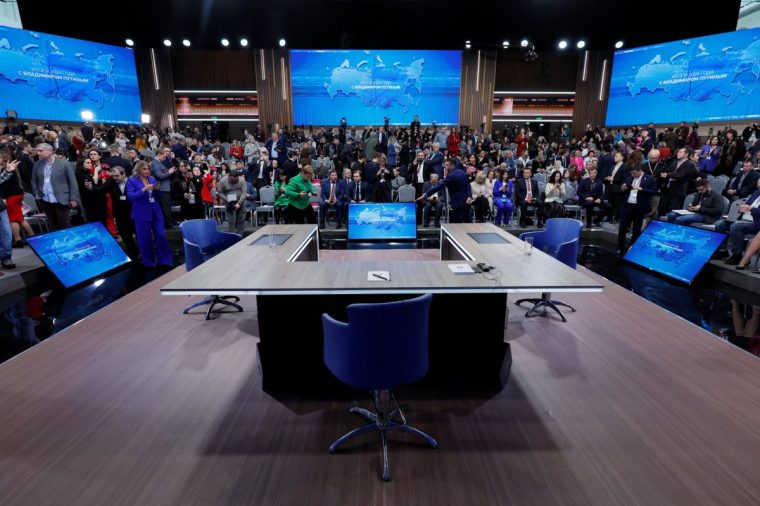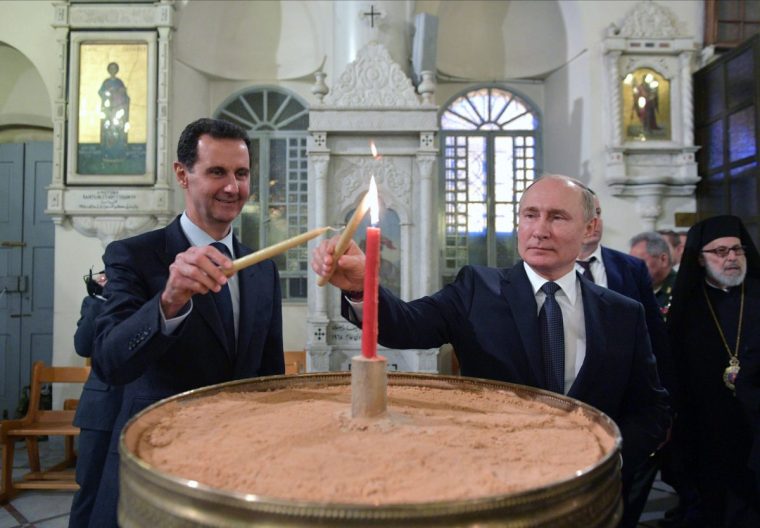Vladimir Putin suggested a missle “duel” with the US and spoke about changes to Russia’s nuclear doctrine during his annual end-of-year news conference.
The event took place in a specially constructed TV studio near the Kremlin on Thursday. Footage showed a venue packed with video screens and journalists waving colourful placards in a bid to catch the President’s attention.
According to the state-run news agency Tass, there were more than two million questions submitted this year via phone calls, text messages, and social media platforms.
Last year, during the carefully choreographed press conference, he addressed Russia’s heavily sanctioned economy, relations with the West and China, and the war in Ukraine.
This year, journalists heard Putin’s first public comments since the fall of his ally, former Syrian president Bashar Al-Assad, and his perspective on the incoming presidency of Donald Trump.
The event was a chance for Putin to assert his strength on the international stage and manufacture a favourable narrative ahead of the new year. Here are the key topics he addressed:
Nuclear weapons and missiles
Russia’s President was asked a question about changes to Russia’s nuclear doctrine after he changed conditions under which the country would consider using its nuclear arsenal last month.
It now states that an attack from a non-nuclear state, if backed by a nuclear power, will be treated as a joint attack on Russia.
When asked if he thought Western nations had heeded the message he said:
“I don’t know, you should ask them.” He said the changes are in response to “emerging military threats… like the emergence of anti-missile systems”.
He also suggested a missile “duel” with the US that would show Russia’s new Oreshnik hypersonic ballistic missile could defeat any US missile defence system.
“We’re ready for such an experiment,” Putin said, adding that the Oreshnik was a modern weapon but based on previous Russian designs.
The weapon was first fired at Dnipro in Ukraine on November 21 in a response to Ukraine’s first use of Western weapons to strike deep into Russian territory.

War in Ukraine
Putin said Russian forces were moving towards achieving goals in Ukraine and were taking control of territory.
“I must say that the situation is changing dramatically… There is movement along the entire front line. Every day,” he said.
“Our fighters are reclaiming territory by the square kilometre every day. The fighting is difficult, so it is difficult and pointless to guess what lies ahead… [but] we are moving, as you said, towards solving our primary tasks, which we outlined at the beginning of the special military operation.”
He claimed Russia remained open to negotiations with Ukraine, but accused Kyiv of refusing to engage in talks.
When asked if he was willing to compromise “in any way” over Ukraine, Putin responded by calling politics “the art of compromise”. He claimed Russia had consistently signaled its readiness for negotiations, but alleged Ukraine had declined to participate.
Putin referred to a 2022 draft agreement from peace talks in Istanbul, asserting that Kyiv initially agreed to the terms but later abandoned the deal. He attributed Ukraine’s claimed withdrawal to Boris Johnson, claiming that, during a visit to Kyiv, Johnson urged Ukraine to “fight to the last Ukrainian”.
Ukraine has dismissed this narrative, as has the former UK prime minister, who has called it “nothing but total nonsense and Russian propaganda,” according to remarks he made to The Times in September.
The fall of Assad
Putin addressed the situation surrounding Bashar al-Assad, making his first public comments since the Syrian regime fell to rebel forces earlier this month.
Russia’s President confirmed Assad and his family had arrived in Moscow, though he had not yet met with the former Syrian leader. He said he planned to speak with Assad soon.
The collapse of Assad’s regime was marked by a rapid 12-day offensive by rebel foreces led by the Islamist group Hayat Tahrir al-Sham (HTS). Despite years of Russian military support that bolstered Assad’s grip on power during Syria’s civil war, Putin dismissed the notion that the regime’s defeat signalled a setback for Russia. He claimed Assad’s forces abandoned their posts without resistance.
Putin insisted that Russia’s military bases in Syria remained under control and claimed they would serve as hubs for distributing humanitarian aid.
He later promised to question Assad about missing US journalist Austin Tice, who disappeared in Syria 12 years ago.

Donald Trump
Putin said he had not spoken with the US president-elect in over four years and was uncertain about when they might next meet or talk.
“I am ready to meet him if he wishes,” the Russian leader stated.
The two leaders last met at the G20 summit in Japan in 2019, where they held discussions on the sidelines.
Since his election victory last month, Trump has already spoken with Ukrainian President Volodymyr Zelensky. They met in person during Zelensky’s visit to New York in September. During that meeting, Zelensky expressed optimism, stating he was “certain” the war with Russia would end sooner under Trump’s leadership.
Gaza
When asked about Israel’s war in Gaza, Putin stated: “Our stance is not subject to political expediency. The resolution of the Palestinian issue can only be achieved by addressing its root causes.”
He emphasised the United Nations Security Council’s support for a two-state solution, noting: “Israel was established, but Palestine has yet to be.” He described this as a fundamental problem and criticised Israel’s ongoing settlement activities in occupied territories, calling them unlawful.
“I am not certain what goals Israel is pursuing with these actions,” Putin added, underscoring the complexities of the conflict.
Inflation at 9 per cent, and economic challenges
Putin addressed questions about the state of the country’s economy, where high inflation and sanctions are starting to bite.
“Everything stands and falls with the economy,” he told the audience, emphasising its central role in producing internal stability inside Russia.
Despite the inflation rate climbing to 9.3 per cent, Putin described the economic outlook as positive, claiming that wages and real disposable incomes had risen. He projected economic growth for next year to be approximately 3.9 per cent.
However, he acknowledged challenges ahead, particularly concerning monetary policy. Russia’s central bank, which raised interest rates to 21 per cent in October, may need to implement further rises to curb inflation.
He later denied that Western sanctions had had a crippling impact, claiming they were “not a key factor” in the country’s high interest rates and inflation.



Maurice Saatchi: I used to adore capitalism – then I had lunch with Margaret Thatcher